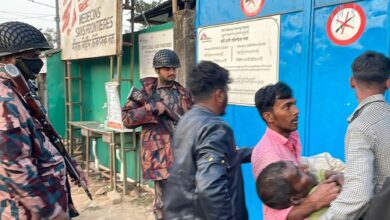
India’s ongoing export of weapons parts to Myanmar, as detailed by activist organisation Justice for Myanmar (JFM) in a new story published on Wednesday, may provide ways for the Myanmar military to circumvent international sanctions.
According to the article, titled “India supporting Myanmar junta atrocities through supply of gun barrels”, export records show that the Indian state-owned firm Yantra India Limited sent a consignment of high-calibre, 122mm howitzer barrels to Myanmar in October 2022.
The barrels are a component part in artillery that the military has used in indiscriminate shelling of civilian areas, documented most recently in Kachin State’s Hpakant and Bhamo townships in December 2022, JFM said.
India is not a party to the international Arms Trade Treaty and is not obligated to abide by its nonproliferation requirements. However, in 2017 India voluntarily signed the non-binding Wassenaar Arrangement, which sets expectations for transparency and responsibility in exporting arms and other technologies with a potential military use.
According to JFM, by exporting weapons to the Myanmar military and cooperating with the junta on defence matters, India and Yantra are failing to meet the standards of the Wassenaar Arrangement, enabling atrocities, and may be in breach of international humanitarian law.
“Justice For Myanmar calls on India to immediately impose an arms embargo on the Myanmar military junta, and cease all training and other military support, which enables junta atrocities. We also call on Yantra India Limited and its production units to immediately stop doing business with the Myanmar military… Not doing so further exposes the company, and the State that owns it, to liability under international law,” JFM said.
India is not the only exporter of weapons components that enable the regime’s violence against Myanmar’s people, according to a report published by the Special Advisory Council for Myanmar (SAC-M) in January. SAC-M named businesses that had supplied materials and parts to Myanmar’s arms manufacturing industry from thirteen countries in Asia, Europe, and the Americas, potentially implicating them as complicit in the junta’s atrocities.
However, considering India’s lack of sanctions against the junta and the extent of India’s economic ties to trade partners outside the region, there is a particularly strong chance that unchecked movement of weapons parts from India to Myanmar may compromise the effectiveness of Western governments’ sanctions against the regime.
For example, the junta has acquired supplies from the Indian manufacturers that import Swedish-made weapons components or produce them under licenses granted by Swedish partners.
As revealed by JFM in a previous investigation last year, the Indian manufacturing firm Sandeep Metalcraft sold fuzes to a Myanmar company brokering arms supplies for the Myanmar Police Force, owned by a couple with direct familial and personal connections to the military.
Fuzes are devices that cause explosive material to detonate in shells, bombs, and grenades. At least one shipment from Sandeep Metalcraft to the Myanmar arms brokers, completed in 2019, included 3,000 units of fuze 447, a part designed for use in the Swedish-made Carl Gustaf grenade rifle.
Swedish businesses are obligated to observe sanctions imposed on the Myanmar military regime by the European Union (EU), including an arms embargo that has been in place since the 1990s. However, the Myanmar military is known to have fought resistance forces using the Carl Gustaf recoilless rifle, a light weapon used by infantry to fire grenade rounds, according to an op-ed in the Swedish newspaper Sydsvenskan.
“Myanmar’s military has used the Carl Gustaf in attacks against resistance groups and the civilian population,” noted the authors of the op-ed, representatives of nongovernmental organisations Swedish Peace, the Swedish Burma Committee, and the Karen Peace Support Network of Myanmar.
“As recently as spring 2022, members of a local resistance group stated that the Carl Gustaf was used in a brutal attack in Karen State, near the Thai border. After the attack, ammunition for the Carl Gustaf, which had been exported in the early 80s, was found to have been left behind,” they added.
The producer of the Carl Gustaf rifles—Saab Group—has not exported the weapons directly to Myanmar since the 1980s. Sweden is not known to have violated the EU’s arms embargo and the Myanmar military appear to be using the same rifles they imported from Sweden decades ago.
However, as revealed by the 2022 JFM investigation, the military’s use of the rifles is made possible by the military’s access to Swedish-designed parts, which have reached Myanmar in spite of the decades-old arms embargo and more recent sanctions.
The Myanmar military’s acquisition of weapons parts has prompted questions about the effectiveness of sanctions and other measures–including company-level policies–intended to prevent proliferation of arms or their use against civilians.
The export of Swedish-designed and licensed weapons components to Myanmar not only contradicts India’s stated position on international arms control, but also violates end-user terms in the Indian companies’ agreements with their Swedish partners. The terms, which require certification of the last buyer or recipient of the weapons parts, have not stopped Indian manufacturers from selling them to the junta.
“Among other things, we want to know what steps Saab has taken to get to the bottom of the export of fuze 447 to Myanmar and what the company has done to prevent its products from being exported to Myanmar in the future in violation of the EU’s arms embargo,” the authors of the Sydsvenskan op-ed wrote.
A report published jointly last month by investigative advocacy organisations Global Witness and Earthrights International found inefficiencies and failures in the implementation of international sanctions imposed on the Myanmar junta.
Noting the ease with which the military and its cronies had circumvented sanctions, the report recommended applying them to a broader network of junta-connected targets, and urged closer coordination among the sanctioning governments and entities to ensure effective enforcement.



